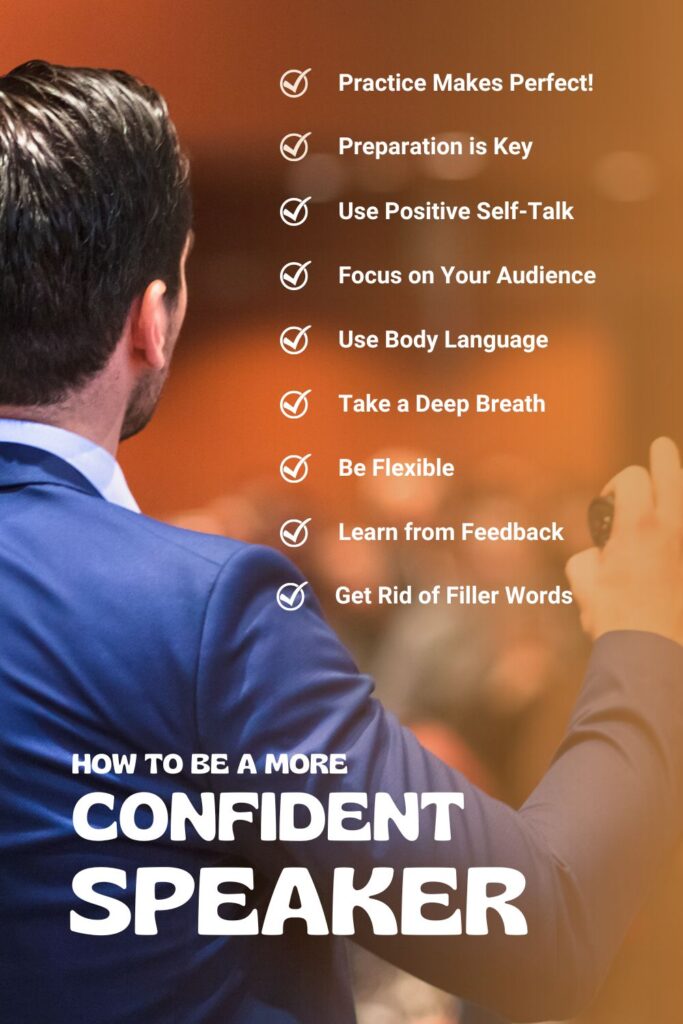Public speaking is a skill many people need to have if they are in an environment that deals with a lot of people. For example, if you are a lawyer, you will have a hard time convincing the judge your client is innocent if you don’t sound confident yourself. If you’re a teacher, you will have a hard time controlling rowdy students who think you’re submissive and shy!
Heck, you don’t even need a job like this but would likely benefit from skills in confident speaking anyway. For example, if a very pushy man is trying to get into your space at a bar, you can loquaciously tell him to bugger off far away from you.
Thankfully, confidence in speaking can be developed through practice, preparation, and a positive attitude.

Here are some tips to help you become more confident in speaking:
1. Practice Makes Perfect!
The more you speak, the more comfortable and confident you will become. Consider joining a public speaking club or group where you can practice your speaking skills in a supportive environment. You can also just practice at home with your loved ones and friends—whichever people you trust to give you helpful tips on how you can improve.
2. Preparation is Key
Before speaking, take the time to prepare your material. Make sure you understand the topic and have the necessary information to present. This will help you feel more in control and reduce anxiety.
We highly recommend, especially if you’re a beginner, to create bullet points of what you’re going to say. Don’t write down a whole speech as it just makes you sound robotic—instead, tackle each bullet point, figure out what you’re going to say for each, and then keep practicing until you get it right. The bullet points will make you remember what you want to say without the whole robot voice.
3. Use Positive Self-Talk
Be kind to yourself and use positive self-talk. Remind yourself that you are capable and prepared. Avoid negative self-talk such as “I can’t do this,” or “I’m going to mess up,” as this will only make you feel bad before you even begin! And if you do end up speaking not as great as you’d hope, don’t give up—there will always be more chances for speaking in the future. Your life isn’t ending just because you gave a bad speech!
4. Focus on Your Audience
Instead of focusing on yourself and your nerves, focus on your audience and what you can do to connect with them. Remember that they are there to listen to you and would like to see you shine, not sweating uncontrollably and shuffling papers. If it helps, you can ask a loved one to sit in the audience while you speak to give you a confidence boost.
5. Use Body Language
Nonverbal cues such as eye contact, posture, and gestures can help convey confidence and engagement. Use them to your advantage when speaking. In the same way, certain gestures such as playing with your clothes or hair, shaking in place, and shuffling your feet around can also be signs that you’re nervous. Figure out which gestures look good and what don’t before you get up there.
6. Take a Deep Breath
Take a deep breath and speak slowly. This will help you relax and project your voice. This can also shake the jitters off and ground you back to reality—there’s no use being worried as this won’t do anything good for you or your speech.
7. Be Flexible
Be prepared to adapt to unexpected changes or interruptions. This will help you handle difficult situations with grace and confidence. Again, we highly recommend having bullet points as you can pinpoint easily where you were interrupted.
You can even use the mild interruption as an opportunity to crack jokes or take questions from the audience!
8. Learn from Feedback
Seek feedback on your speaking skills and take it as an opportunity to improve. You can’t figure out what to improve yourself on if you don’t know what to improve yourself on! Additionally, getting feedback is important when you want to know what your audience likes. For example, if you’re a teacher and find that talking casually with your students works better than talking strictly like you usually do, you can then practice talking casually.
9. Get Rid of Filler Words
Filler words like “um”, “ah”, and “like” can make you sound uncertain and less confident. Practice speaking without them when you start being confident in your speaking abilities. As a beginner, filler words are okay if you’re trying to remember your train of thought and fill the silence. However, as you start speaking more, getting rid of them helps get your message across.



